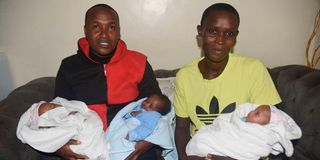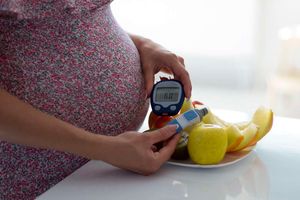Pregnancy after 40: The odds and risks to expect

Charles Makau and his wife Purity Toyian with their triplets at their home in Lower Kabete, Kiambu County on June 3. Purity, 42, was diagnosed with deep vein thrombosis after delivery.
What you need to know:
- For women aged 40 and above, the risk of pregnancy complications such as high blood pressure, pre-eclampsia and gestational diabetes increases.
- Older women are also at a higher risk for miscarriage in early pregnancy. Chances of developing twins or other multiple pregnancies increase with age.
Immediately after the birth of her triplets in April, Purity Toyian, 42, was diagnosed with deep vein thrombosis (DVT) that formed in her left leg.
DVT occurs when a blood clot forms in one or more of the deep veins in the body, usually in the legs.
Luckily, the problem was quickly identified and she started treatment immediately. “This was before I got discharged after delivering my triplets. I had to spend a few more days at the hospital,” says Purity.
Eventually, she got discharged, but the doctor warned her against travelling for a long distance for some time.
According to Dr Saudah Farooqui, a gynaecologist at Nairobi West Hospital, women over 40 are more predisposed to numerous challenges especially during multiple births.
Dr Wachira Murage, a gynaecologist at Savannah Hospital in Nairobi, notes that in women aged 40 and above, the risk of pregnancy complications such as high blood pressure, pre-eclampsia and gestational diabetes increases. “Older women are also at a higher risk for miscarriage in early pregnancy,” says Dr Wachira, adding that chances of developing twins or other multiple pregnancies increase with age.
Purity and her husband Charles Makau had almost given up on having more children after years of trying following the birth of their second born, who is now eight years old.
“Our first born, who is now 12, has cerebral palsy and so after our second child was born, we decided to take a break from trying to conceive. But later on, this delay made us struggle to get another baby when we finally decided to try again. No matter how much we tried, we just weren’t successful,” explains Charles.
According to Purity, this struggle to conceive came as a surprise to her since prior to this, she never had any problem trying to get pregnant. “In 2021, I saw a gynaecologist who prescribed some supplements, which I took just once,” explains Purity.
In October last year, their wait came to an end after Purity was confirmed to be pregnant with the triplets. Despite her age, she says, there wasn’t anything unusual about the pregnancy.”
The pregnancy was smooth save for what she considers to be minor hitches towards her due date. “The doctor had scheduled for cesarian section on May 8, but the water broke on April 20, and so I had to be transferred by an ambulance from Kajiado to Nairobi for the operation,” says Purity.
The babies were born prematurely and had to be taken to the neonatal intensive care unit, where they stayed for four weeks before being discharged.
Generally, Dr Saudah says, having multiple births is a danger to any woman regardless of age.
“The most common complication of multiple births is premature labour. If you’re pregnant with multiple babies, you are more likely to go into premature labour (before 37 weeks) than a woman carrying only one baby,” she explains.
She adds that foetal growth restriction is common. “This condition happens when one or more of your babies is not growing at the proper rate. It might cause the babies to be born prematurely or at a low birth-weight.”
Dr Saudah indicates that placenta abruption (an emergency situation which happens when the placenta detaches from the wall of the uterus before delivery), is also common, apart from the possibility of developing gestational hypertension (high blood pressure during pregnancy), which can lead to a dangerous condition called pre-eclampsia.
“Complications related to high blood pressure happen at twice the rate in women carrying multiples compared to women pregnant with only one baby.”
Dr Saudah explains that even though these and more health risks are associated with all sorts of multiple pregnancies despite age, women above 40 tend to be at a higher risk.
“For example, blood pressure increases during pregnancy and in your 40s, and it could manifest as a chronic illness.”
So, what could this mean to women who are deciding to start families after hitting 40? Studies have shown that multiple pregnancies are becoming more common among women over 40.
“Data worldwide shows that with age, the probability of multiple pregnancies increases slightly up to the age of 43, from where it declines again. There is a 0.3 per cent rate of multiple pregnancy in women under 25, 1.4 per cent between 25 and 34, 3 percent between 34 and 39, 4 percent in women in their forties or over.”
According to Dr Saudah, there are some theories that trigger these pregnancies for women within these age brackets. One of them, she says, is self-preservation.
“Since the eggs are not as healthy as age advances, these women are more likely to ovulate twice. The cycles come a little bit erratic after the age of 40, and so there might be some months where there is no ovulation at all, whereas there may be some months where there are multiple ovulations.”
Dr Saudah avers that the use of fertility drugs is another reason contributing to an increase in these cases. “This is where assisted reproductive technology ART is used. It involves use of medication orally or injections to stimulate the ovaries to release more than an egg, and so they might release two to three eggs, or even more depending on the dose you’re using and the condition of the patient.”
The women can also undergo in vitro fertilisation (IVF) -transferring more than one fertilised egg into your uterus. If more than one or two embryos are transferred, you’re more likely to get multiple births. “





